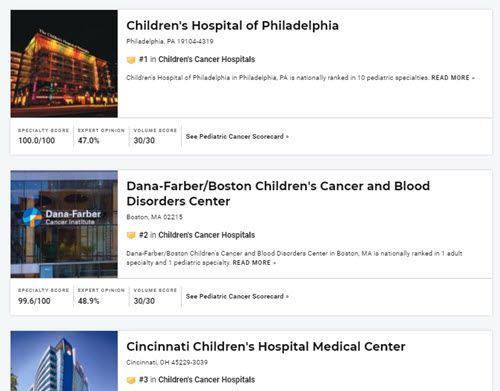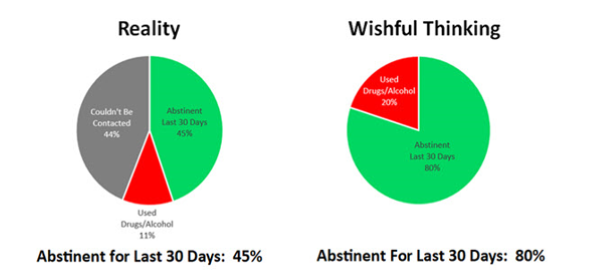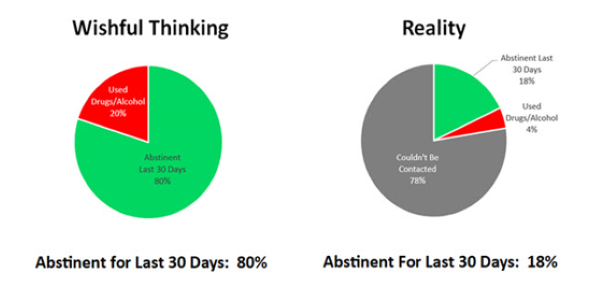I will never forget how terrifying it was every time we had to decide which rehab to send our daughter to. I knew that whether she died of alcohol poisoning or (please, God!) eventually recovered from her addiction hinged on our making the right treatment decision, and I desperately wanted to choose a treatment center with a good track record.
Yet when I asked the rehab sales reps what their success rates were, the honest ones said something like “trust us, we’re one of the best”. And the dishonest ones claimed success rates of 80% or more; one treatment center owner even had the nerve to tell me that 98% of his patients were in recovery! As much as I wanted to believe that addiction treatment could be that effective, I knew he was lying through his teeth – he didn’t care about our daughter; he just wanted our money.
Addiction treatment is healthcare, for heaven’s sake! If our daughter had leukemia, we could go online and immediately learn which pediatric hospitals had the best five-year survival rates:

Why didn’t this type of data exist for addiction treatment?
Once our daughter was finally on the road to recovery, I decided to see what could be done to fill this need. Six years later, the outcomes research company I started has now followed up with 15,000+ patients to learn how they have been doing since leaving rehab.
How Success Rates Should be Scientifically Measured
Former addiction treatment patients are a notoriously difficult group of individuals to keep track of, but by making 10-15 attempts each time, paying them a small amount to complete an outcomes survey, and reaching out to “locator folks” the patient had given us permission to contact should their cell phone no longer work, we’re typically able to reach 50% to 60% of former patients at one, six and twelve months post-treatment. Typically most of the patients who complete surveys report that they’ve been meeting their drug and alcohol usage goals for at least the last 30 days.
The group of patients we aren’t able to contact is statistically very different from the group who respond. Non-responders are far more likely to have left treatment early, to have spent fewer days in treatment, and to be addicted to drugs (such as heroin and cocaine) that are harder to stop using. In fact, quite a few of these individuals who “couldn't be contacted” start to complete our online research survey, but stop when they come to the question “Have you used any non-prescribed drugs or alcohol since you left treatment?”. The fact is, if they don’t respond to our repeated requests to let us know how they’re doing, these individuals are probably using again.
With the exception of multi-year treatment programs treating doctors, pilots or other professionals who will lose their professional licenses if they don’t remain sober, it’s exceedingly rare for more than 50% of patients to be reachable and meeting their treatment goals six or twelve months after treatment. A rehab that tells you that 75% or more of their patients are in recovery one year after leaving treatment is either making this number up or reaching only a portion of their patients and assuming that this small group of patients is representative of all patients.
What It Means When a Rehab Claims 80% of Patients Recover
A few examples might make this clearer. Let’s say 250 patients discharged from Rehab X in 2020, and researchers were able to connect with 56% of these patients. Of the 140 patients who were contacted, 112 (80%) said they were not using any substances and 28 admitted to having used drugs or alcohol in the last 30 days. Here are truthful and deceitful ways to report these results:

Rehab marketers and sales reps want to claim that 80% of their patients are in recovery (in other words, claim that the rehab has an 80% success rate) by ignoring the 110 patients who didn’t respond to the research. Unfortunately, this is wishful thinking. Of the 250 patients who were treated at this center last year, only 112 patients (45%) were reachable and meeting their recovery goals after treatment.
A rehab claiming an 80% success rate is not telling you a very crucial piece of data – what percentage of their patients is this number based on? It’s quite possible (and, in my experience, extremely likely) that they’re only contacting a very small percentage of their patients. Just about any rehab can send out an email or two to former patients, get a small percentage to reply, and unethically pretend to have a very high success rating:

If correctly reported, this rehab's 18% success rate would earn them 0 stars on Conquer Addiction.
Where to Find Accurate Rehab Success Rates
My daughter and I created Conquer Addiction to provide independently-verified success rate data to families searching for high-quality addiction treatment. Rehabs interested in promoting their success rates can submit outcomes research results to Conquer Addiction’s independent panel of expert judges once each quarter and receive a 1-star to 5-star success rating. Rehabs are free to use any outcomes research company they wish or even do the research themselves as long as they follow the outcomes research requirements set by the judges.
Recovering from addiction is incredibly difficult. Everyone embarking on this journey deserves to be able to attend a rehab that can prove that the treatment it provides is effective.
Find the Best Rehab Near Me
And if you must choose a rehab that isn’t tracking its outcomes (because the sad truth is that most rehabs still aren’t bothering), please help the families who will need treatment next year by asking the center to start monitoring and reporting their outcomes.



